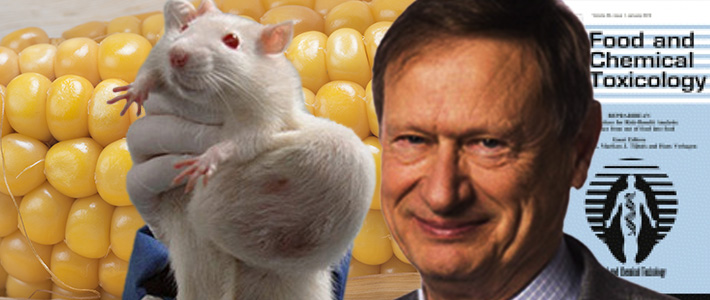Update on Seralini debate
FOR MORE INFO:
http://bioseguridad.blogspot.com/search/label/Seralini
Did journal editor read the Seralini paper before retracting it?

******
End double standards in evaluating GMO safety studies – say scientists
TO READ THE FULL DOCUMENT:
http://www.ensser.org/media/0813/
Europe’s food safety agency only criticises studies that find risk, new analysis shows
ENSSER Press release
17.12.2013
The controversy about the Séralini et al. study, which reported negative health effects of Monsanto's NK603 GM maize and Roundup herbicide fed to rats over the long term,[1] is still going on. According to a new review published in Environmental Sciences Europe, the European Food Safety Authority (EFSA) used unscientific double standards to dismiss the Séralini study on genetically modified (GM) maize.[2]
The publication of this latest review comes just days after the retraction of the Séralini paper by Elsevier, the publisher of Food and Chemical Toxicology (FCT), on the unprecedented grounds of the “inconclusive” nature of some of the findings. ENSSER condemned the retraction[3] .
Hartmut Meyer, one of the authors of the new review, said, “Use of such double standards is a common response from scientists calling for GMO deregulation and, somewhat surprisingly, also from some government authorities, to studies that show negative environmental and health effects of GMOs. Only those studies that find problems are subjected to excessive scrutiny and rejected as defective. This approach appears to be a tactic to avoid dealing with ‘inconvenient’ results, whilst selecting for ‘convenient’ results."
http://bioseguridad.blogspot.com/search/label/Seralini
Did journal editor read the Seralini paper before retracting it?

In defending his retraction of the Seralini paper, the journal's editor makes a series of highly damaging admissions.
EXCERPT:
The Editor-in-Chief of Food and Chemical Toxicology, A. Wallace Hayes, has come under severe criticism after retracting from his journal the paper by Seralini et al on the long term toxicity of Roundup and a Roundup-tolerant GM maize. He has now published a defence of the retraction, which we reproduce below.
Here are some of the major problems with Hayes' defence of his retraction decision:
1. Hayes states that Dr Seralini's "claim (ie, conclusion) that Roundup Ready maize NK603 and/or the Roundup herbicide have a link to cancer is unreliable" because the data on this are "inconclusive". He goes on to say that "Dr. Séralini deserves the benefit of the doubt that this unreliable conclusion was reached in honest error. The review of the data made it clear that there was no misconduct. However, to be very clear, it is the entire paper, with the claim that there is a definitive link between GMO and cancer that is being retracted."
BUT there is no claim or conclusion in the paper "that Roundup Ready maize NK603 and/or the Roundup herbicide have a link to cancer"; nor does the "entire paper" "claim that there is a definitive link between GMO and cancer". IN FACT, THE ENTIRE SERALINI PAPER DOES NOT MENTION THE WORD "CANCER" ANYWHERE!
Here are some of the major problems with Hayes' defence of his retraction decision:
1. Hayes states that Dr Seralini's "claim (ie, conclusion) that Roundup Ready maize NK603 and/or the Roundup herbicide have a link to cancer is unreliable" because the data on this are "inconclusive". He goes on to say that "Dr. Séralini deserves the benefit of the doubt that this unreliable conclusion was reached in honest error. The review of the data made it clear that there was no misconduct. However, to be very clear, it is the entire paper, with the claim that there is a definitive link between GMO and cancer that is being retracted."
BUT there is no claim or conclusion in the paper "that Roundup Ready maize NK603 and/or the Roundup herbicide have a link to cancer"; nor does the "entire paper" "claim that there is a definitive link between GMO and cancer". IN FACT, THE ENTIRE SERALINI PAPER DOES NOT MENTION THE WORD "CANCER" ANYWHERE!
******
End double standards in evaluating GMO safety studies – say scientists
TO READ THE FULL DOCUMENT:
http://www.ensser.org/media/0813/
Europe’s food safety agency only criticises studies that find risk, new analysis shows
ENSSER Press release
17.12.2013
The controversy about the Séralini et al. study, which reported negative health effects of Monsanto's NK603 GM maize and Roundup herbicide fed to rats over the long term,[1] is still going on. According to a new review published in Environmental Sciences Europe, the European Food Safety Authority (EFSA) used unscientific double standards to dismiss the Séralini study on genetically modified (GM) maize.[2]
The publication of this latest review comes just days after the retraction of the Séralini paper by Elsevier, the publisher of Food and Chemical Toxicology (FCT), on the unprecedented grounds of the “inconclusive” nature of some of the findings. ENSSER condemned the retraction[3] .
Hartmut Meyer, one of the authors of the new review, said, “Use of such double standards is a common response from scientists calling for GMO deregulation and, somewhat surprisingly, also from some government authorities, to studies that show negative environmental and health effects of GMOs. Only those studies that find problems are subjected to excessive scrutiny and rejected as defective. This approach appears to be a tactic to avoid dealing with ‘inconvenient’ results, whilst selecting for ‘convenient’ results."

1 Comentarios:
Thanks for some other informative web site. Where else may just I
get that type of information written inn such a perfect approach?
I've a challenge that I am simply now running on, and I have been at the look out for such info.
Also visit my web-site ... Starlink Driveway Wireless Headphone Reviews
Publicar un comentario
Suscribirse a Comentarios de la entrada [Atom]
<< Página Principal